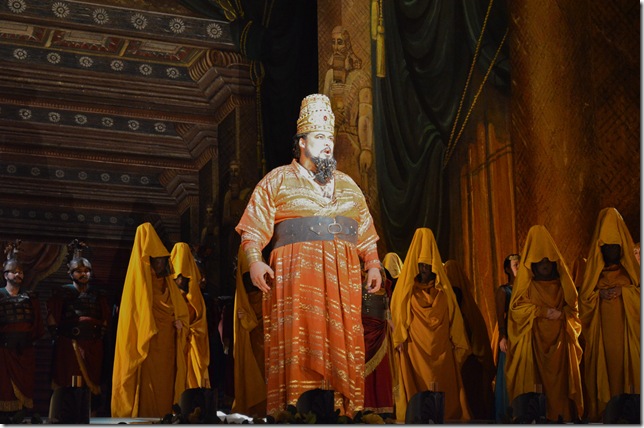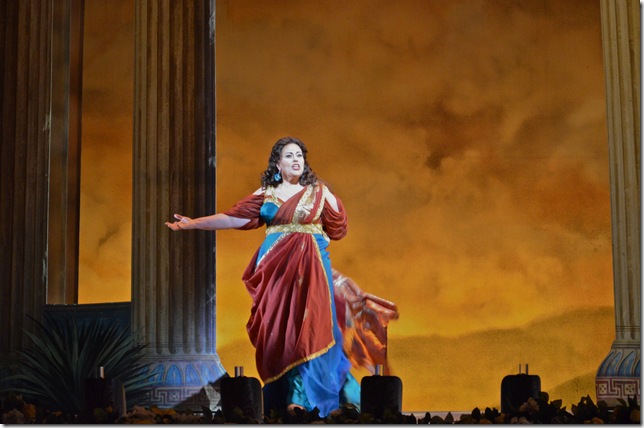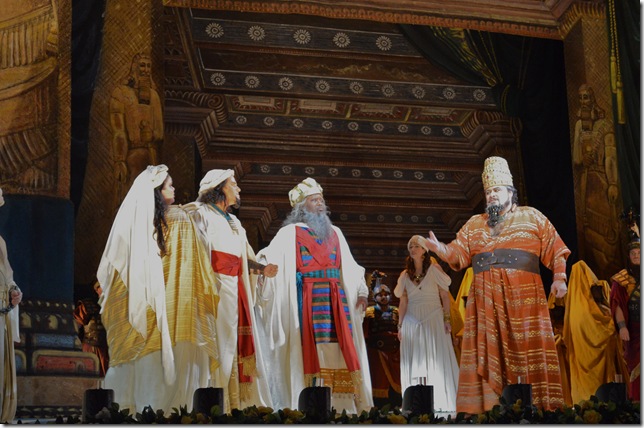There is something about Florida Grand Opera’s current production of Nabucco that brings out what I imagine to be the atmosphere of its first groundbreaking performances in 1842.
It may have to do with the way the set and the costumes combine with the conviction of the performers, the prominence with which the chorus is used, or the ferocity of fresh discovery that its conductor and orchestral musicians bring to Giuseppe Verdi’s first big hit.
Match all that to the singalong in the third act, when the audience is invited to join in on a reprise of Va, pensiero, creating a cozy little church community in F-sharp major, and you have some sense of the affection in which this work must have been held at the time, and some understanding of its historical importance.
In short, FGO’s second production of the season is a good one, and one that avoids the static feel of religious oratorio that afflicts some mountings of this opera.
I happened to catch the second cast of this double-cast opera Feb. 1 at Miami’s Ziff Ballet Opera House, in which Cuban-American bass-baritone Nelson Martinez sang the title role, and the American soprano Susan Neves took on the part of the ambitious, duplicitous Abigaille. (In its remaining performances tonight and Saturday at the Broward Center, Uruguay’s Dario Solari is the Babylonian king and the Russian soprano Maria Guleghina is Abigaille.)
Neves, a New Yorker, has made a speciality of Abigaille, and has sung it in the leading houses of the world, including the Metropolitan Opera and the Vienna Staatsoper. She brings to the role, a large, powerful voice with an especially strong lower register, heard to good effect in the more florid moments early on. The part also requires her to be the standout voice at the top of the big concertato ensembles, and in her first entrances, those high notes were inclined to shrillness, a quality that lessened as her instrument warmed up.
Her command of Verdi’s athletic writing was impressive, particularly in the Anch’io dischiuso set piece in Act II when she is reading the secret document that explains her slave origins and making her plans for domination; she brought a wide range of emotion to the aria, even an unexpected sweetness, which made it more interesting. As an actress, she was believably haughty and imperious as she sat on Nabucco’s throne, but somewhat stagey in moments such as when she tore up the birth document.
Still, Neves makes a forceful, intense Abigaille, and the large audience at the opera house gave her the biggest ovation at the curtain.
Martinez, as Nabucco, has a rich lyric voice, and in his Act IV desperation aria, Dio di Guida, that vocal quality and his acting ability were best matched. There, he was compelling as a human being who was suffering, which suited him and his voice better than the regal poses and stentorian utterances he had to assume otherwise. Martinez has a creamy, attractive voice, and he sang well throughout the opera, if without any of the bronze quality that helps give the role weight.
As the priest Zaccaria, American baritone Kevin Short was at his best in the Vieni, o Levita prayer in Act II, accompanied by a very fine cushion of cellos in the orchestra. His is a strong voice with good forward projection, ideal for reaching out to his nervous Israelites, and in this aria the emotion in his singing was heartfelt and moving.
The Uruguayan tenor Martin Nusspaumer, in the small role of Ismaele, showed off an exciting, romantic sound in a part that historically has been a discovery role for new tenors; he made a good impression on the ears in Moreno Torroba’s Luisa Fernanda at FGO a couple seasons back, and one hopes to hear him in a breakout role soon. The fine California bass Adam Lau was a good High Priest of Baal, hampered somewhat by a pair of ridiculous giant rubber hands with which he was forced to grasp his walking staff.
The Florida mezzo Mabel Ledo, as Fenena, sang her O dischiuso è il firmamento in Act IV beautifully; her voice has presence, lovely coloring, and an appealing naturalness. Young Artists members Casey Finnigan, as Abdallo, and South Florida’s own Betsy Diaz, as Anna, both offered large, effective voices in their brief appearances.
The chorus is an essential part of this opera, and chorus master Michael Sakir has done an great job in making them ready to carry so much of the burden of Nabucco. With the possible exception of some male weakness in the soldier contingent in Act I, this was a chorus that had no problem handling lots of work and handling it well. The Va, pensiero chorus was unusually sensitive, starting in an almost muted way before bursting out at the words Arpa d’or. It’s that kind of smart touch that makes the chorus a living, breathing character in the opera and not just vocal troops dragged on to add sonic heft.
The Florida Grand Opera orchestra, under music director Ramon Tebar, was excellent in every respect, and a reminder to local audiences that this opera company, and Palm Beach Opera as well, are most fortunate in the level of orchestral playing they’re able to draw on for their productions. Tebar is a passionate and vigorous conductor, but his mannerisms and his current focus on extreme contrast led in the first act to some ensemble problems, particularly in the finale, when singers and orchestra were not together in one of the tempo changes; Neves notably looked away from the action and locked her eyes on Tebar to figure out what the tempo was supposed to be.
Thaddeus Strassberger’s set was very traditional, with a simple raised platform providing all the action contrast one needed, and with skillful painted palace backdrops giving an illusion of closeness and depth at the same time. Mattie Ulrich’s costumes were gorgeous, with a wonderful palette of bright Levant colors for chorus and supernumeraries, and striking red and gold hooded garb for the priests. Well-lit by Mark McCullough (whose lightning bolt in Act II worked very well), the whole effect was lovingly old-fashioned and perfectly suited for the story.
Stage director Leigh Holman kept the action moving, and wisely refrained from the frieze approach, which, while understandable with a Biblical topic, tends to make it a long evening. Holman always had something, even small, going on, from crowds parting for Nabucco’s entrance from far upstage to a long, hobbling stage cross by the High Priest. This was a Nabucco with some life and energy, and demonstrated why this was such a landmark work in Italian opera.
Nabucco can be seen tonight and Saturday at 7:30 p.m. at the Broward Center for the Performing Arts in Fort Lauderdale. For tickets or more information, call 800-741-1010 or visit www.fgo.org. The Broward Center can be reached at 954-462-0222 or by visiting www.browardcenter.org.


